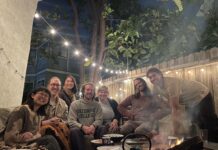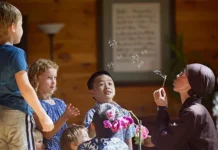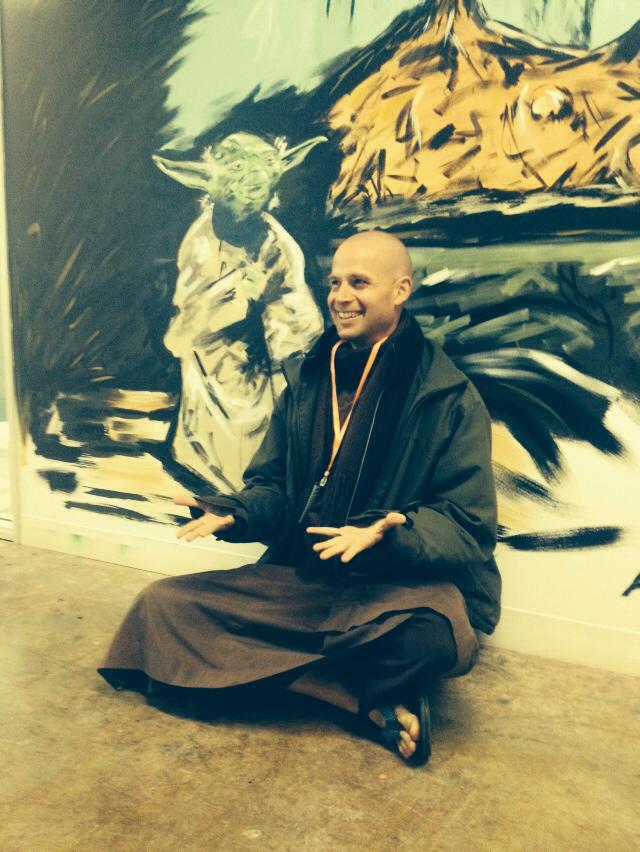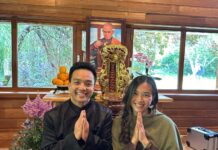Everyone who has been to Plum Village or came to one of the Wake Up tours must have noticed the tall and shining presence of Phap Luu aka ‘Brother Stream’, and his ever continuing energy that he puts into the Plum Village community and Wake Up. He strives to create brotherhood and sisterhood wherever he goes. Our Wake Up reporter decided to sit down on a sunny French summer day and have a little chat with him about this thing called ‘community’ and everything that comes with it.
What’s the most important thing you have learned as a monastic?
Brotherhood and sisterhood, the importance of practicing together. That is something you learn in every moment living in the monastery by living, eating, walking, suffering, and having happiness together.
I came to the path to deal with my suffering, with stuff that was happening with me, but the most important thing I have encountered in Plum Village is this brotherhood and sisterhood. This is really the thing we need to change the world, especially with young people. There is a lot of mistrust in the world. Love for your neighbour is not always there; you do not even always know who your neighbour is. But if you nourish the seeds for it, it will be in yours, and the seeds are nourished here in this community.
It is a practice every moment. It is not always easy to live together. There are a lot of things that come up: preferences, judging, prejudice… But you have to let go of your ideas about yourself, your pride, jealousy, desire. You just have to be completely present in the moment, and then all of that will go away. That is how the path of the Buddha, the Dharma, creates a Sangha. If we let go of our small idea of ourselves, then what is left is a deep intimate connection with each other.
Sometimes certain practices, like meditation, can somehow actually build up our egos and make us more proud. So Thay is always reminding us to keep it real. And for me it means that it has to have the quality of brotherhood and sisterhood. If your practice does not have that, then something is wrong. And that is also the core of Wake Up. Wake Up is about feeling brotherhood and sisterhood too.
How has your engagement with Plum Village affected your family?
It has brought a lot of happiness. At first they did not know what we monastics do and they thought that maybe I would go to a cave in the mountains, do meditation and look at my belly all day long. A lot of us have that concept of monastic life. But in fact, in the Buddha’s time, it was not like that at all. In the Buddha’s time the monastics lived and practiced together.
When my parents came, they started to see the ‘family’ aspect of this practice. They were not only my parents, but also of the other brothers and sisters, who even called them mom and dad. And they get the practice through that personal contact with the other monastics and retreatants. It just happened in a very natural way, without even intending to do so.
What is your biggest dream for your practice and the community?
That we all wake up together in every moment (smiles). And the more we practice, the more that becomes reality, so it is a self-fulfilling dream (laughs). The more I am aware of how things really are, I feel happier. And the more we are as a community, the more we remove the judging and anger. Plum Village might one day stop to exist, but as long as we continue to practice together wherever we are, then that collective awakening is still going on.
I also have some more concrete goals like the Wake Up Schools project, bringing the practice to teachers and through them to young people, so they know especially how to deal with a strong emotion. Because when you see things like school shootings, if somebody had ever learned the killers how to embrace their anger, then this senseless violence might not have happened.
But then again, a project like this, is just an extension of this collective awakening. If the teachers are not happy and free, then they cannot share that with their students. So Wake Up Schools, too, is not about sharing techniques or a curriculum, but more about connecting with teachers and help them to wake up in their own lives.
How did you get involved with Wake Up and Wake Up Schools?
There were a lot of seeds for Wake Up. When I was novice, more then ten years ago, we already started doing retreats for young people here, although they were still only very small. Then in 2005 Thay went back to Vietnam for the first time (after being in exile for over 30 years, ed.) and got in contact with a lot of young people on the tour.
He saw that we were tapping into a huge potential. Moreover, after founding the Bat Nha monastery in Vietnam, he saw loads of young people coming there leaving their jobs and studies to become monastics. So I think Bat Nha was a huge seed of Wake Up.
And then in 2008 Thay met with a few of us at the end of the second Vietnam tour and that is when he shared that he wanted to create a group of youth for a healthy and compassionate society. Soon after that, they came up with a shorter title here in Plum Village: ‘Wake Up!’ At the time I was in Deer Park and there had already been coming a lot of young people there.
But doing our first Wake Up retreat and giving it a name helped to bring the young people together. That first retreat was one of the best experiences in my life as a monastic. I felt really touched by it. It really felt like a movement happening.
Then I came back to Plum Village in 2009 and connected with some of the younger monastics and we started organising the first Wake Up tours. These had a big impact. I think somehow we hit the right nerve, by organising the tour as a community. There are a lot of solitary Dharma teachers travelling through the west, but it is much easier to create community when you show the community that is actually on tour together.
How would you describe Wake Up to someone who has never heard of mindfulness before?
Wake Up is about transforming ourselves, our suffering, and helping others to do it by our example. And we do that by being aware of what is happening in our body, in our mind, in the present moment. And we do it together, creating a community of young people who have that deep aspiration to transform.
We might start out seeing things in society that we might want to change, but at some point we see that, in order to really change things in a meaningful way, we have to learn how to transform ourselves first. And doing that as a community really helps us, because if we are just on our own, we might think our practice is very strong, but we are actually not able to live in harmony and to transform the conflict in a difficult situation.
We get a lot of strength and energy from the collective practice, especially as young people who want to live a meaningful life. When I finished college, I wanted to do that, but I did not have a path for it. So now there is Wake Up, a family of spiritual friends that are there for you. And that is the greatest gift there is (smiles).


















